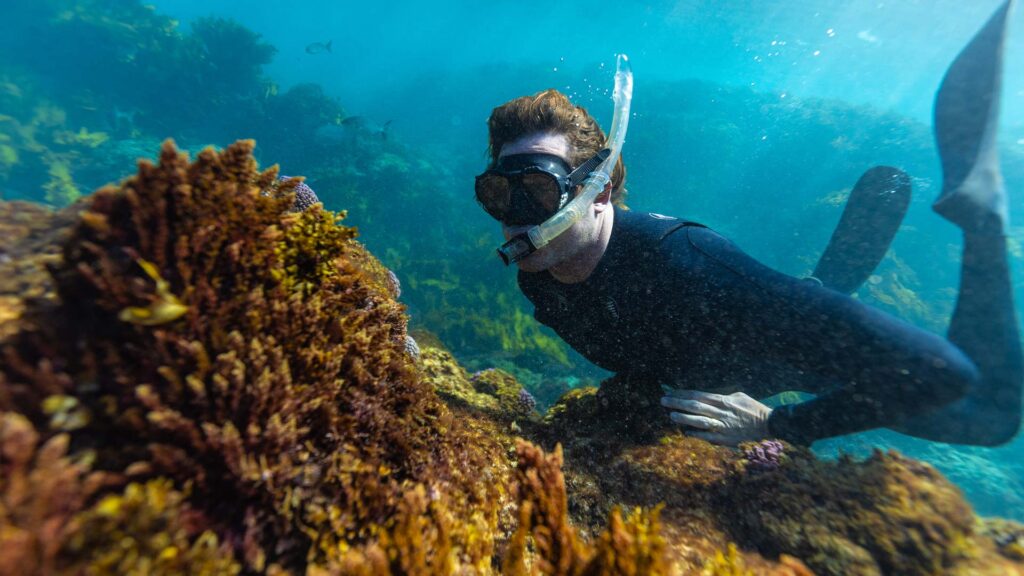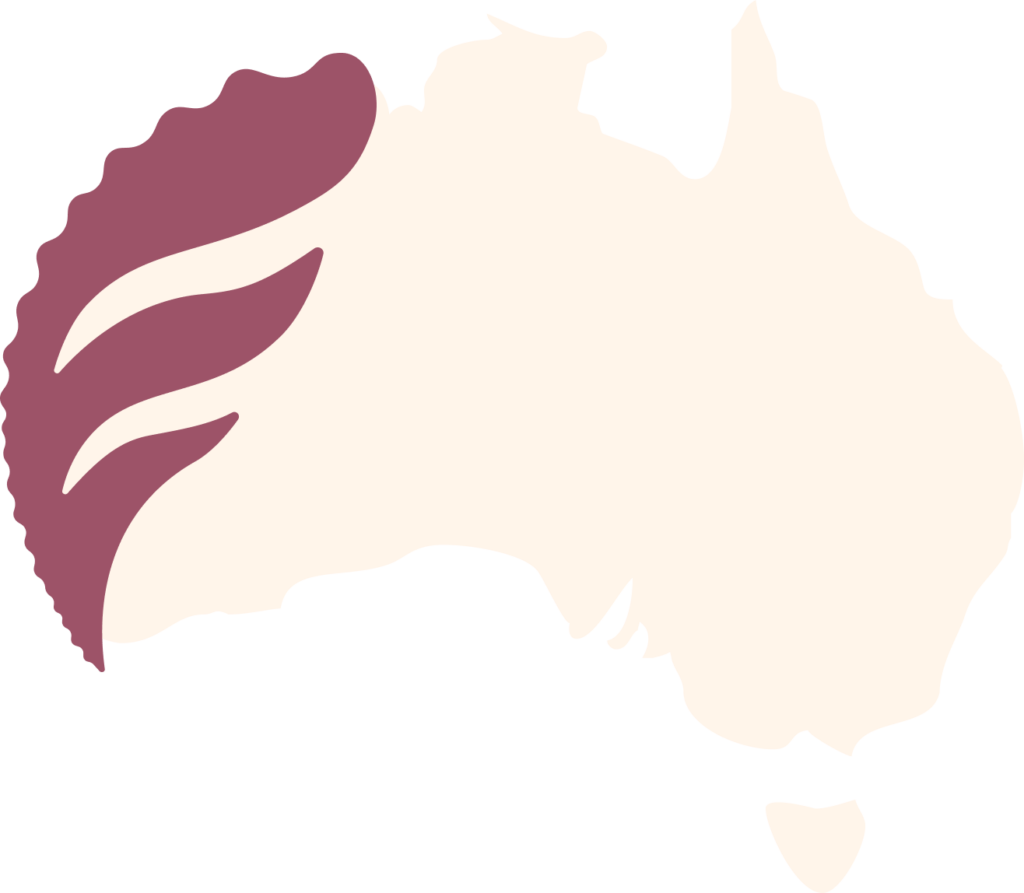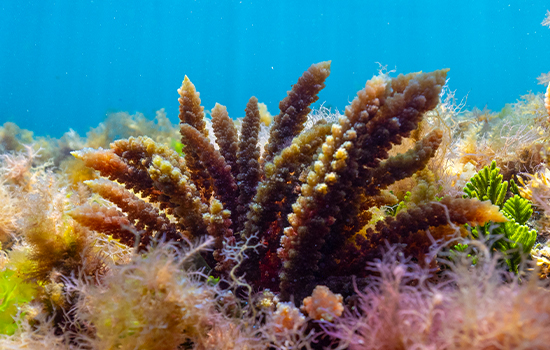ASPARAGOPSIS
Asparagopsis is a native Australian seaweed that is the most efficient natural methane supplement for ruminant livestock.

WHAT IS APARAGOPSIS?
Asparagopsis is a native Australian seaweed that has been shown by CSIRO to be the most efficient natural methane supplement for ruminant livestock, with a reduction of more than 80%, Asparagopsis is rich in the bioactive compound bromoform, a defence mechanism for life in the ocean. When Asparagopsis is added to cattle feed, either whole or as an extract, this compound inhibits an enzyme in methane-producing microbes living in the gut of cattle and other ruminants. CSIRO found this particular seaweed to be the most efficient natural methane supplement for ruminant livestock. At a 0.5% feed inclusion rate, it can reduce methane emissions by more than 80% and improve feed conversion efficiency by 7.4%, ultimately lowering costs for farmers.
BENEFITS OF ASPARAGOPSIS
REDUCING METHANE
Ruminant animals, predominantly cattle, produce approximately one quarter of global methane emissions. Methane is the second-largest contributor to climate change after carbon dioxide, but it is far more potent. A single tonne of methane has the same warming effect as 28 tonnes of carbon dioxide, averaged over a 100-year period.
NATURE BASED
On average, one cow emits roughly as much greenhouse gas as one car and globally, livestock produce more than the aviation and shipping industry combined. By producing a bioactive compound responsible for inhibiting methane production in a cow’s gut, Asparagopsis poses a powerful, nature-based solution to combatting livestock emissions.
LOW-IMPACT
Asparagopsis feed supplement is added to the cow’s diet at a low inclusion rate. This game-changing methane-reducing feed supplement is particularly effective for feedlot and dairy cattle where the animal is in a controlled feeding location
SCALING SUSTAINABILITY
FutureFeed was established by CSIRO in 2020 to commercialise their groundbreaking discovery, and they are continuously expanding their network of licensees and partners to scale up production and meet the huge demand from cattle farmers.
THE CULTIVATION PROCESS
The journey of Asparagopsis from reef to feed is a unique process that combines science, innovation, aquaculture and a dedicated team.
Selective Harvesting
Cultivation begins in Derbal Nara (Cockburn Sound), where we selectively collect a small amount of Asparagopsis in the wild for our broodstock collection.
Controlled Development
We carefully monitor and keep our broodstock clean in an onshore facility, nurturing it until it is ready to be deployed on our long lines at our lease. Here, we let nature do the work and wait until the Asparagopsis has grown large enough to harvest.
Stabilisation and Processing
Once harvested, we need to move quickly to stabilise and process the product. This can be achieved by immersing it in oil and extracting the bromoform or freeze drying the whole plant.
Sustainable Cultivation
A little goes a long way - only a tiny amount of Asparagopsis is collected from the wild for our hatchery and used to grow vast amounts out at sea, minimising our impact on wild populations.
Ocean-grown
We are taking advantage of Western Australia’s pristine waters to cultivate Asparagopsis in an offshore ocean lease. Located in Fremantle, we utilise the natural properties of the water, and don’t require any additional nutrient or energy inputs.
Research Collaboration
We are working with scientific advisors at Drift who are assisting the Australian Sustainable Seaweed Alliance (ASSA) to further the industry in Australia, and we welcome collaborations with other research partners.
LOCATION ADVANTAGE

Our competitive edge is our location – Western Australia. WA has the latitudinal advantage of a 10,000km long coastline where we see Asparagopsis growing year-round up and down the coast.
Fremantle Seaweed is located in the ‘goldilocks zone’ for Asparagopsis cultivation, where we can grow both the warm water variety (Asparagopsis taxiformis) and the cold-water variety (Asparagopsis armata).
MARKET BENEFITS
We must support cattle farmers to lower their methane emissions and be climate change resilient. This can be achieved by offering Asparagopsis feed supplement at zero cost. Asparagopsis has a range of added benefits to achieve a zero-cost product for cattle farmers:
Increased feed conversion ratio
FutureFeed have released a report that indicates that animal performance as average daily weight gain and feed conversion efficiency is improved by feeding low levels of Asparagopsis.
Low-carbon product premium
As market research shows, 1 in 4 consumers are willing to pay a 15% premium on carbon neutral beef products.
Carbon credit
FutureFeed have submitted a methodology with the Emissions Reduction Fund for Asparagopsis feed supplement to be recognised by the Australian Carbon Credit Units (ACCU) scheme.
Biodiversity Credits
Biodiversity credits are emerging as a way to offset costs by enhancing local biodiversity via innovative infrastructure.
PRODUCTS MADE FROM ASPARAGOPSIS

Over several years, CSIRO peer-reviewed studies have shown Asparagopsis can reduce more than 80% of methane emissions in ruminant livestock with a 60g/day/cow supplement, with a 7.4% increase in feed conversion rate. This game changing methane reducing feed supplement is particularly effective for feedlot and dairy cattle where the animal is in a controlled feeding location. Research shows that meat and dairy products from Asparagopsis-fed cattle are safe for humans to consume and with no impact to product quality.
Consumers care. Market research has shown that 1 in 4 consumers would pay up to 15% more for carbon neutral beef mince and porterhouse steaks. Separately, over 30% of Aussies have shown a willingness to pay an additional $1 for a burger from low-emitting cows who were raised on Asparagopsis. The consumer-led revolution to access low-carbon footprint products is now driving supermarkets to offer a range of zero or low carbon meat and dairy products. The Australian red meat industry has a target to be carbon neutral by 2030 and Asparagopsis is now fully approved for cattle and consumers of beef and dairy in Australia to help achieve this.

